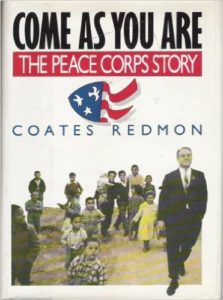# 2 Mad Men of the Peace Corps–Kennedy (Washington, D.C.)
Pat Kennedy wasn’t a relative to the ‘other’ Kennedys, but he was never anxious to tell others that. It was nice in those balmy days of 1961 to ride the smooth carpet of the most famous name in America. Though, in all honesty, Pat never ‘lived off’ the name. He made his own way to Washington, D.C. and the Peace Corps. He was a good guy who treated everyone fairly, and unlike many others, didn’t use his ‘connection’ to make his way in the agency or the world.
[Leaving the government in 1972, Kennedy would move to Columbia, Maryland and become essentially the mayor of that planned community for next 26 years until his retirement.]In 1961, however, he was like most of those early staffers, young, twenty-eight, married to wonderful smart wife, Ellen Conroy, the sister of Frank Conroy, who wrote Stop-Time, and was for years director of the Iowa Writer’s Program.
Pat, too, was an academic when he started at the Peace Corps. He was a teaching fellow at the University of Wisconsin in Madison (history) when he heard about JFK’s late-night challenge to the students at the University of Michigan. It was an idea that he loved.
Pat Kennedy also had a connect to JFK–a real connection–and that was Lemoyne Billings, a close friend of JFK. Pat had worked with Billings while campaigning for Kennedy in Wisconsin.
Some background on Padraic. He was from New York and named after the Irish poet, Padraic Colum. (Pat did not write poetry, but his wife Ellen was a French scholar who translated African poets into English before that became vogue. She was a first class scholar in her own right. I was reading Ellen’s essays in the Kenyon Review while in graduate school before I ever heard of the Peace Corps or Pat Kennedy!)
Pat had been in the Army in Europe (drafted, as we all were in those days) and then studied at Columbia, and was awarded a Woodrow Wilson Fellowship. He was going to be a teacher. At Wisconsin, he had earned his M.A. in American history, publishing articles in historical journals about Senator Robert LaFollette and the foreign policy of the Progressives.
But all that academic stuff went out the window when he took over the job of directing Kennedy’s campaign headquarters in Madison in JFK’s run for the White House. Pat says of that period, “my effectiveness was considerably enhanced by my name. Everyone wondered which of the Kennedys I was.”
After the campaign, he turned down the job of Executive Director of the Democratic Party in Wisconsin. He wanted to be in Washington where the action was. And that’s where Lemoyne Billings comes into the story. 
In her book, Come As You Are: The Peace Corps Story, Coates Redmon quotes Kennedy:
“Arriving in D.C. I made a date with Lem Billings to go hear George Shearing at the Embers, and I told him I was really interested in the Peace Corps. As luck would have it, Lem was going down to Palm Beach the next day to be with the president-elect. He scared me, though. He said he didn’t know for sure whether or not JFK had used the peace corps idea as campaign bait or whether he was interested in it seriously–whether it was actually going to be part of his administration. Then I thought to myself. ‘Now, don’t be ridiculous. The man proposed it in a major foreign policy speech. [Cow Palace] Surely he couldn’t renege on it.”
“I didn’t hear anything from Lem for about a month, and then one night back in Madison after grading blue books until 2:00 a.m., I fell asleep when the phone rang. It was so cold I almost didn’t get up, but you wonder about phone calls at that hour, so I got up and answered it. A woman said, ‘Mr. Kennedy? The White House is calling.’ In a second, there was Lem Billings on the phone saying cheerily, ‘Guess where I am.’
“I said, ‘Are you at the White House by any change?’
“I’m not only at the White House,’ said Billings. ‘I’m in the Lincoln bed. Are you still interested in the Peace Corps?’
“Damn right!’
‘Well, I’ve talked to Sarge Shriver and he’d like you to come to Washington for an interview immediately. How soon can you get here?’
‘I said, ‘I’ll be there in twenty-four hours.'”
No comments yet.
Add your comment